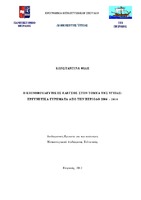Ο κοινοβουλευτικός έλεγχος στον τομέα της υγείας: ερευνητικά ευρήματα από την περίοδο 2006-2010.
Parliamentary control in health sector: research findings for the period 2006 – 2010.

Προβολή/
Θεματική επικεφαλίδα
Πολιτική υγείας -- Ελλάδα ; Ελλάδα -- Βουλή ; Εθνικό Σύστημα Υγείας (Ελλάδα) ; Δημόσια υγεία -- Ποιοτικός έλεγχοςΠερίληψη
Δεδομένου ότι η Ελλάδα θεωρείται παγκοσμίως η κοιτίδα της Δημοκρατίας, η Βουλή των Ελλήνων αποτελεί αναμφισβήτητα την κορωνίδα των δημοκρατικών θεσμών. Η Βουλή των Ελλήνων ασκεί τις αρμοδιότητές της, το Νομοθετικό έργο και τον Κοινοβουλευτικό Έλεγχο, σύμφωνα με όσα προβλέπονται στον Κανονισμό της και το Σύνταγμα. Το Σύνταγμα αποτελεί τον καταστατικό χάρτη της χώρας, διασφαλίζοντας μέσω των διατάξεών του, τα δικαιώματα των Πολιτών και τις υποχρεώσεις του Κράτους. Σύμφωνα με το Σύνταγμα, η προστασία της Υγείας αποτελεί κατοχυρωμένο δικαίωμα των Πολιτών και το Κράτος οφείλει να μεριμνά για τη διασφάλισή του. Ωστόσο, αν και στην εποχή μας, σε σχέση με το παρελθόν, η κατάσταση Υγείας του πληθυσμού της Ελλάδας έχει βελτιωθεί αισθητά, καταγράφονται φαινόμενα έντονης δυσαρέσκειας των Πολιτών, αναφορικά με το Σύστημα Υγείας, δεδομένου ότι βρίθει ανεπαρκειών, βάσει των οποίων εγείρονται ερωτήματα, περί ισότητας, λειτουργικότητας και αποτελεσματικότητάς του. Ο εντοπισμός κατ’ αρχήν και η διαχείριση, κατ’ επέκταση, των ανεπαρκειών του Συστήματος Υγείας, επιτελείται σε πολλά διαφορετικά επίπεδα ελέγχου, στην κορυφή των οποίων βρίσκεται ο Κοινοβουλευτικός Έλεγχος. Επομένως ο Κοινοβουλευτικός Έλεγχος, αποτελεί το ύψιστο επίπεδο ελέγχου της χώρας, στο οποίο «καταλήγουν» όσες ανεπάρκειες του Συστήματος Υγείας δεν κατέστη εφικτό να αντιμετωπιστούν στα προηγηθέντα επίπεδα ελέγχου. Ο συνδυασμός των προαναφερθέντων στοιχείων, αποτέλεσε το έναυσμα για την εκπόνηση της παρούσας Διπλωματικής Εργασίας. Πρόκειται για μια εξειδικευμένη και πρωτότυπη έρευνα με θέμα τον Κοινοβουλευτικό Έλεγχο στον τομέα της Υγείας, η οποία βασίστηκε σε χίλια είκοσι δύο (1022) κατατεθέντα Μέσα Κοινοβουλευτικού Ελέγχου στην Βουλή των Ελλήνων, κατά τη διάρκεια της χρονικής περιόδου 2006-2010, με Υπουργείο αναφοράς το Υπουργείο Υγείας και Κοινωνικής Αλληλεγγύης. Η επεξεργασία και ανάλυση των δεδομένων της έρευνας πραγματοποιήθηκε με το Πρόγραμμα Στατιστικής Επεξεργασίας S.P.S.S και η κατηγοριοποίησή τους βάσει της Διεθνούς Κατηγοριποίησης Λογαριασμών Υγείας του Ο.Ο.Σ.Α. Σύμφωνα με τα ευρήματα της έρευνας, στον Κοινοβουλευτικό Έλεγχο στον τομέα της Υγείας συμμετείχαν Βουλευτές, «απλά μέλη» των Κοινοβουλευτικών Ομάδων, πλειοψηφικά της Αντιπολίτευσης, εκπρόσωποι των μεγάλων αστικών κέντρων, ως επί των πλείστον Γιατροί, καταθέτοντας ατομικά κυρίως, Ερωτήσεις Εθνικού Ενδιαφέροντος. Τα επικρατέστερα προβλήματα του τομέα της Υγείας που αναδείχθηκαν μέσω των διαδικασιών του Κοινοβουλευτικού Ελέγχου, αφορούσαν στη Διοίκηση και ασφάλιση της Υγείας, στην Επένδυση πάγιου κεφαλαίου των παρόχων υγειονομικής περίθαλψης, στα Νοσοκομεία και στην Κρατική χρηματοδότηση, αντικατοπτρίζοντας τοιουτοτρόπως σε μεγάλο βαθμό, τις διαπιστωμένες ανεπάρκειες του εν λόγω τομέα. Επίσης, σημειώνεται η «σύγκλιση απόψεων», που εντοπίστηκε μεταξύ βουλευτών των διαφορετικών Κοινοβουλευτικών Ομάδων και μεταξύ Βουλευτών και Πολιτών, αναφορικά με τα προαναφερθέντα προβλήματα. Επί προσθέτως, επισημαίνεται το φαινόμενο διαρκούς επανάληψης των ίδιων ακριβώς προβλημάτων του τομέα της Υγείας, που παρατηρήθηκε καθ’ όλο το διάστημα της έρευνας, η συνεκτίμηση του οποίου με την καταγεγραμμένη απουσία ουσιαστικής διαχρονικής βελτίωσής τους, εγείρει σημαντικά ερωτήματα περί αποδοτικότητας, αποτελεσματικότητας και εν γένει «καταλληλότητας» της Πολιτικής Υγείας που εφαρμόζεται στη χώρα. Τέλος, υπογραμμίζεται η σχέση που ανιχνεύτηκε μεταξύ του χρόνου διεξαγωγής των Εθνικών Εκλογών και των καταγεγραμμένων διακυμάνσεων της συμμετοχής των Βουλευτών στη διαδικασία του Κοινοβουλευτικού Ελέγχου, του τύπου των κατατεθέντων Μέσων Κοινοβουλευτικού Ελέγχου καθώς και της εμβέλειας του περιεχομένου τους.


